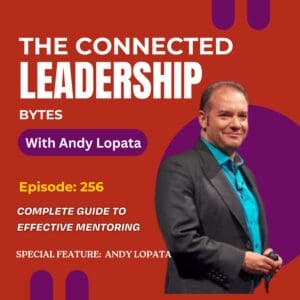In this episode of the Connected Leadership Bytes, we feature Andy Lopata’s guest interview on the Authority Podcast with Ross Romano. Andy is a specialist speaker on professional Relationships and co-author with Dr Ruth Gotian, of the Financial Times Guide to Mentoring.
Mentoring in its various forms and benefits for both mentors and mentees is discussed. Andy explains that mentoring isn’t just a hierarchical senior-junior relationship; it can be reverse mentoring (junior mentoring senior), peer-to-peer and formal/informal approaches. He emphasises the importance of having a “mentoring team,” drawing support from various individuals.
Andy and Ross agree that the qualifications for being a mentor are experience and expertise rather than formal qualifications. Andy explains the distinctions between mentoring, Coaching, role models, and sponsors.
The podcast also discusses what mentors should expect from mentees (commitment, accountability, openness to challenge) and vice versa. Andy also advocates for an abundance mentality in mentoring, both at an individual and organisational level, arguing that investment in mentorship yields significant returns in terms of staff retention, upskilling, and creating a positive work environment.
Key Takeaways:
-
Diverse Mentoring Models: Andy shared that mentoring extends beyond the traditional hierarchical model to include reverse mentoring, peer-to-peer mentoring, and informal mentoring teams, catering to diverse needs and situations.
-
Clarity of Objectives: He emphasised the crucial role of clearly defined goals and objectives for both mentor and mentee to ensure the relationship’s effectiveness and to prevent it from stalling.
-
Honest and Supportive Guidance: The balance between honest feedback and supportive encouragement is critical. Mentors should challenge mentees while providing the support needed to succeed.
-
Accountability and Commitment: A successful mentoring relationship requires both parties’ commitment and willingness to be held accountable for agreed-upon actions and goals.
-
Organisational Mentorship Programmes: To be successful these programmes require strategic planning, senior management buy-in, and peer-level support to ensure effectiveness and prevent resentment within teams.
SELECTED LINKS FROM THE EPISODE
Connect with Andy Lopata: Website | Instagram | LinkedIn | X/Twitter | YouTube
Connect with Ross Romano: Website |LinkedIn |X/Twitter
The Financial Times Guide to Mentoring
Andy Lopata is a specialist speaker on professional relationships, mentoring, networking, and social media strategy. He is a firm believer that professional relationships underpin our success in business, our roles, and our careers. The right relationships with the right people can lead to new business opportunities, investment, collaborative working, innovation, and career progress. We just need to be comfortable approaching those relationships strategically, without making people feel ‘networked’ by us.
Andy has worked in the field of networking and professional relationships for 25 years, working with global giants such as Paypal, GSK, AstraZeneca, Wella, HSBC, Wembley Stadium, the BBC, and the Prime Minister’s Office of the UAE, among many others during that time. He has also worked with leading universities including NYU, Duke University, and Oxford University’s Said Business School.
A regular blogger for Psychology Today, Andy has been quoted in The Sunday Times, The Financial Times, and The Guardian, as well as many other national and regional newspapers and magazines worldwide. He has written or co-authored six books on networking and professional relationships, with his sixth book, "The Financial Times Guide to Mentoring," being published in Spring 2024. He is also the host of The Connected Leadership Podcast and has interviewed globally recognized names in business, academia, sports, and entertainment for the show.
Andy has been inducted into the PSAE Hall of Fame – the Professional Speaking Association Award of Excellence, which was held by only 21 other speakers at the time it was presented. He is a Fellow and a former President of the Fellows’ Community of the Professional Speaking Association (PSA), a Fellow of the Learning and Performance Institute (LPI), and a Member of the Association of Business Mentors and the Meetings Industry Association.
